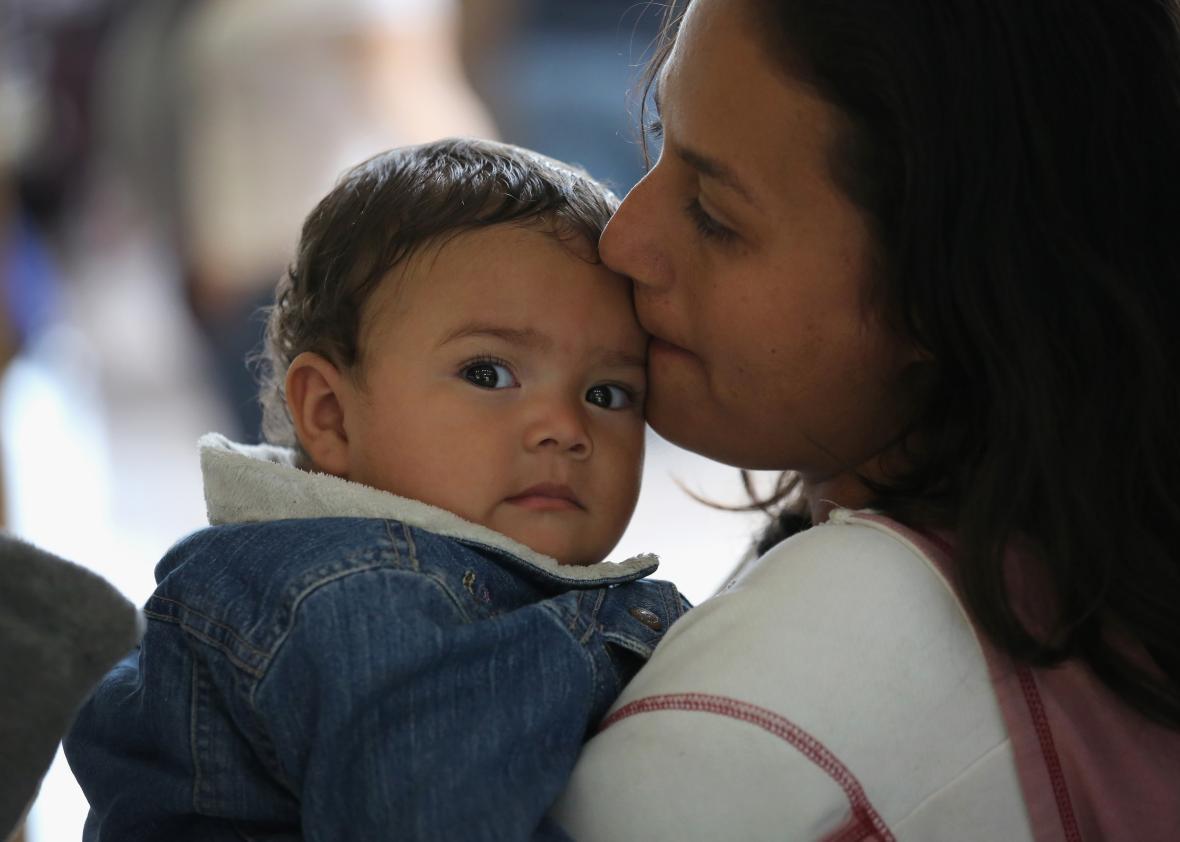Immigrant mothers and children apprehended after coming north across the U.S.-Mexico border may be separated from one another if a proposed Department of Homeland Security policy goes through. Three government officials told Reuters that DHS is considering changing its current system, wherein families crossing the border are either detained together in family detention centers or allowed to live in the U.S. while applying for asylum or waiting for their court hearings, which could be months or even years away.
If DHS adopts the proposal, mothers would remain in the U.S. immigrant detention system and their kids would be removed into protective custody with the Department of Health and Human Services. Children would remain in government custody until a relative in the U.S. or a “state-sponsored guardian” could take over. Reuters’ sources said that Donald Trump and members of his administration intend the proposed policy to act as a deterrent, making it even less attractive for women to leave their homes with their children to escape the violence and poverty that sends them fleeing across borders.
“It’s hard for most Americans to imagine what level of unsafety and insecurity must exist to cause a parent to feel like this is their best option for keeping their family safe,” Avideh Moussavian, a policy attorney at the National Immigration Law Center, told Slate, calling the proposal a “really gratuitous measure of cruelty” toward people who’ve already survived the trauma of a long journey from their home countries. “I think that it’s appalling that we would receive those families, rather than by assuring that they’re O.K. and that we can provide them safety, that we’re subjecting them to this horrific possibility of being separated from their young children. It serves absolutely no policy purpose, and it is potentially in contravention of our international humanitarian obligations.”
Moussavian believes the proposed policy shift, which is reportedly under consideration by DHS officials, has raised concerns that Immigration and Customs Enforcement will rapidly increase the number of families it detains. In response to rising numbers of unaccompanied minors coming across the border near the end of his time in office, Barack Obama oversaw the expansion of family detention, which hadn’t been an enforcement tactic for many years, and the opening of new family detention centers. At the time, that, too, was explained as a deterrent measure.
To Laura Polstein, a senior staff attorney at the Centro Legal de la Raza in Oakland, the deterrent argument rings false and poses a threat to human rights. “People don’t leave their country and travel through multiple other countries, often really dangerous journeys, with their children just for kicks. People are fleeing because their lives are under threat,” she told Slate. “A lot of our clients, a lot of the stories we hear, are that people … get a threat and within that week, they’re gone. I don’t think people are looking into the details of border patrol policy at the moment when they make that difficult decision to leave their home.”
The proposal isn’t just inhumane—it’s logistically untenable. Reuters reports that ICE logged about 54,000 children coming across the border with their guardians in the span of just four months this fall and winter, more than twice as many as were apprehended in those same months the year before. Detention centers and protective custody facilities are not prepared to take on that kind of surge in detainees, so facilities would overcrowd and many other detainees would have to be released. That means this proposed policy, or even just the leaks about its consideration, is more about instilling fear and shame into immigrants—and providing supporters with a perverted sense of victory—than it is about protecting anyone’s safety.
If the policy does go through, the detrimental effects on potentially hundreds of thousands of children and families would be enormous. Family separation has been used as a compliance tactic and a method of dehumanizing individuals in almost every system of state-sanctioned forced labor and detention, from slave plantations to concentration camps in Nazi Germany. “If the U.S. starts [separating mothers from their children] on a wide-scale basis … we’re going to see an impact on the people that happened to for years into the future,” Polstein said. “You hear stories now of much older adults who lived through Japanese internment, for example, as children. That experience had a huge impact on who they became. Mentally, emotionally—that kind of experience is really lasting.”
Moussavian noted that young children are particularly susceptible to long-term harm from being kept in penal-like conditions, like those of the secured Office of Refugee Resettlement facilities kids would likely enter if the proposed DHS policy comes to pass. For parents who expect their trip to the border to be the most perilous part of their journey, arriving to find the government ready to take away their children would be “cruel and unexpected punishment,” she said. “The idea that they wouldn’t be afforded every protection—and that we wouldn’t ensure that people who are afraid to go back have a chance to stay here—really speaks to [the Trump administration’s] total lack of regard for due process protections, let alone just basic humanity.”
